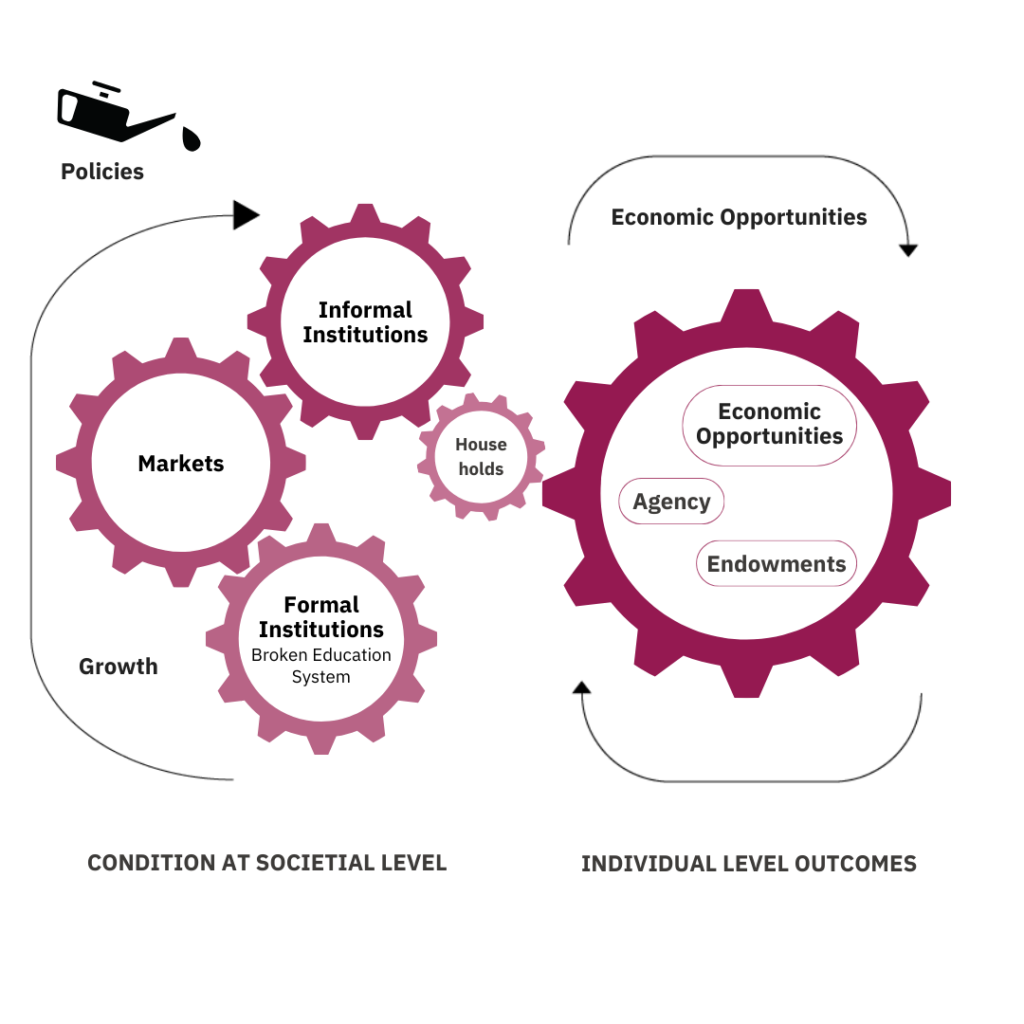Quick links to the information:
Introduction & Case description
Understanding the barriers faced by women and youth from capitalizing on existing economic opportunities.
International organizations play a crucial role in promoting youth and women's employment opportunities globally. They achieve this through various initiatives: firstly, by advocating for policy changes that dismantle barriers to entry, such as discriminatory hiring practices or lack of affordable childcare. Secondly, by funding skills development programs that equip young people and women with the necessary qualifications for the modern workforce. Thirdly, by facilitating access to financing and resources, particularly for women entrepreneurs who face additional hurdles in establishing businesses. Finally, by monitoring progress and holding governments accountable for their commitments towards achieving gender equality and youth employment targets. Through these multifaceted efforts, international organizations strive to create a more inclusive and equitable employment landscape for all.
Our client, a leading multi-lateral international organization wanted to understand & address the unemployment, and in particular the access of women and youth to economic opportunities. The research objective was to assess the access of women and youth to economic opportunities such as employment, contributing to inclusive growth and achieving more effective development outcomes by:
- Contributing to a better understanding of the current situation, challenges, and constraints that women and youth faced in accessing employment.
- In the case of women's access, examining the role of restrictive social norms in accessing employment, identifying constraints faced by women in different sectors, and exploring women's involvement in income-generating activities and micro-enterprises.
- In the case of youth access, gaining insights into the drivers of (and opportunities to limit) economically motivated migration as it related to the three economic sectors.
Our SOlution
Multi pronged Qualitative In-Depth Research
With the aim of understanding the types of barriers that may prevent women and youth from capitalizing on existing economic opportunities, Knometrix gathered information that demonstrated understanding the differences between challenges and opportunities across three main economic sectors: services, industries and agriculture. Knometrix suggested to conduct a qualitative assessment to specifically improve our understanding of the constraints women and youth face. Under qualitative research, we suggested two approaches.
- Focus group: Multiple focus groups were conducted following our selection criteria (women and young people who are facing constrains & challenges in accessing employment opportunities). Quotas were set for gender and age groups and homogenous sampling techniques were used.
- Key informative interviews: Employers and current employees were interviews to understand the gender-differentiated and age specific concerns and behaviors related to the recruitment process. We followed maximum variation technique to ensure choosing the best representatives from the stakeholders.


The results
Insights into Women & Youth Employment Challenges
The qualitative research conducted by Knometrix in collaboration with a leading research agency revealed nuanced insights into the barriers faced by women and youth in accessing economic opportunities across various sectors. It was identified that restrictive cultural expectations often limit women’s mobility and participation in the workforce, particularly in certain sectors. Additionally, the research explored the challenges faced by women in different sectors, highlighting the need for targeted interventions that address these specific limitations.
The research also examined the challenges faced by youth at the individual level. In-depth interviews with employers and current employees revealed insights into age-specific concerns and recruitment practices. These findings were used to develop training programs or policy changes that equip young people with necessary skills and address potential biases in hiring practices.





 Market Research
Market Research Consumer Research
Consumer Research Industry Research
Industry Research Market Entry Strategy
Market Entry Strategy Feasibility Studies
Feasibility Studies Product Research
Product Research User Research
User Research Automobile & Mobility
Automobile & Mobility Banking and Finance
Banking and Finance Consumer Products & FMCG
Consumer Products & FMCG Ecommerce & Retail
Ecommerce & Retail Industry & Manufacturing
Industry & Manufacturing Government & Public Sector
Government & Public Sector Industry Associations
Industry Associations Technology & Software
Technology & Software Venture Capital & PE
Venture Capital & PE Consulting & Advisory
Consulting & Advisory India Entry Market Research
India Entry Market Research Innovation Consulting
Innovation Consulting KX Market Radar
KX Market Radar Business Model Development
Business Model Development Gen Z Navigator
Gen Z Navigator